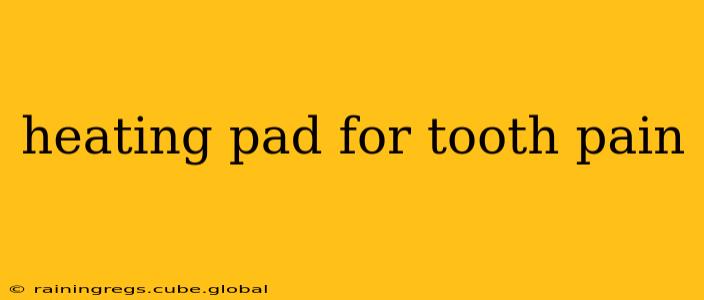Tooth pain can be excruciating, leaving you searching for any form of relief. A heating pad might seem like a logical choice – after all, heat often soothes aches and pains. But is a heating pad truly effective for toothaches, and are there any potential downsides? Let's explore this common question.
While a heating pad can offer temporary relief from some types of tooth pain, it's crucial to understand its limitations and potential risks. It's not a cure-all and shouldn't replace professional dental care. This article will delve into the nuances of using a heating pad for tooth pain, addressing common questions and concerns.
Does a Heating Pad Help with Toothaches?
The effectiveness of a heating pad for tooth pain depends heavily on the cause of the pain. Heat can be helpful for relieving inflammation and muscle tension in the jaw, which can sometimes accompany tooth pain. For example, if your toothache is related to temporomandibular joint (TMJ) disorder, the gentle heat might alleviate the discomfort. However, for pain stemming from an infection, abscess, or nerve damage, a heating pad is unlikely to provide significant relief and may even worsen the situation.
What are the Benefits of Using a Heating Pad for Tooth Pain?
The primary benefit of using a heating pad for tooth pain is its potential to reduce inflammation and muscle tension in the jaw. The warmth can relax the muscles, easing any pain stemming from jaw clenching or grinding. This is particularly helpful if your toothache is related to TMJ disorder or bruxism. However, it's essential to use the heating pad at a low setting to avoid burns and only apply it to the outside of the jaw, not directly on the affected tooth.
What are the Risks of Using a Heating Pad for Tooth Pain?
The main risk associated with using a heating pad for tooth pain is the potential to mask symptoms of a serious underlying condition. If you have a tooth infection or abscess, the heat could exacerbate the problem, leading to the spread of infection. Therefore, a heating pad should never be used as a primary treatment for tooth pain. It should be considered a supplementary measure at best, used only in conjunction with seeking professional dental care. Also, ensure you don't apply the heat directly to the tooth or gum, as this can cause further irritation or burning. Always use a low setting and never fall asleep with the heating pad on.
Can a Heating Pad Help with a Tooth Abscess?
No, a heating pad should absolutely not be used for a tooth abscess. A tooth abscess is a serious infection requiring immediate professional dental attention. Applying heat to an abscess can worsen the infection, leading to more severe complications. See a dentist immediately if you suspect you have a tooth abscess. Symptoms may include severe throbbing pain, swelling, fever, and sensitivity to touch.
When Should You See a Dentist for Tooth Pain?
You should see a dentist for tooth pain if:
- The pain is severe or persistent.
- The pain is accompanied by swelling, fever, or pus.
- You have a visible abscess.
- You have difficulty opening your mouth.
- The pain doesn't improve after a few days of home remedies.
Is a Cold Compress Better Than a Heating Pad for Tooth Pain?
While heat can soothe muscle tension, cold is often preferred for the initial management of acute tooth pain. A cold compress can help numb the area and reduce inflammation. The decision between heat and cold often depends on the cause and severity of the toothache. It's sometimes beneficial to alternate between hot and cold compresses. However, always consult a dentist to determine the most appropriate treatment.
Conclusion:
A heating pad may provide some minor, temporary relief for jaw muscle tension associated with tooth pain, but it's not a substitute for professional dental care. If you're experiencing tooth pain, always consult a dentist to diagnose the underlying cause and receive appropriate treatment. Using a heating pad without addressing the root cause of the pain could lead to more significant problems. Remember, the best approach is always to seek professional help for persistent or severe tooth pain.
